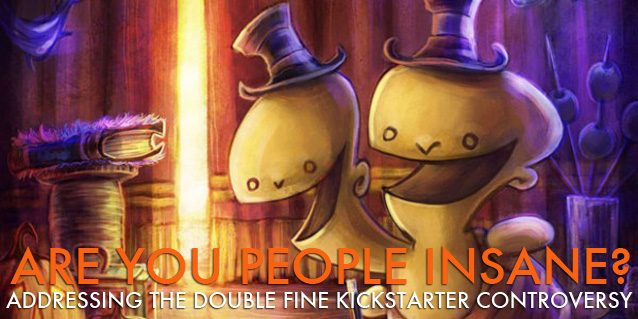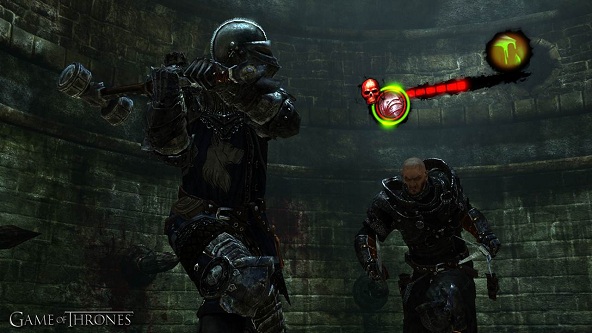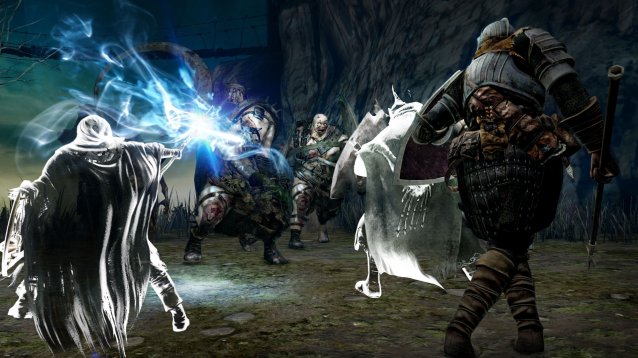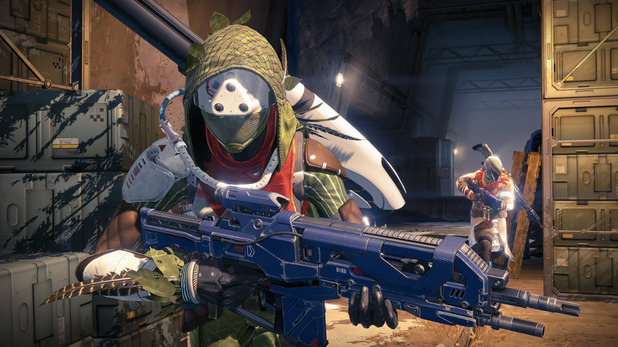


I know gamers can be an opinionated lot. Sometimes in a good way. Many times in a way that sees me calling ‘our’ collective sanity into question. When Tim Schafer and Double Fine productions announced this week that they would be making a brand new point-and-click adventure based on Kickstarter funding, one of those latter moments happened. Gamers over the web started actually backlashing against this supposedly shady and immoral business move.
How dare Double Fine cannibalize the indie business model?Which is where my reaction literally was: Are you people actually insane?
This is a great opportunity for the whole of the gaming business to test the waters for an alternative approach at funding production. A way of possibly getting some space between big publishers and developers, giving the developers more room to breathe.
How does this work? To find out the details, head for the Kickstarter website. In a nutshell: Everyone interested in funding this project can give 15$ or more to Double Fine, of which they will then go and make the game once they’ve hit their target amount—which happened in about 8 hours, with money still pouring in.
These 15$ (or more) per person not only funds the game, as it also provides these investors with the game once it’s done. This is like a pre-preorder, and not even a down payment, but the full deal. Pay 15$, receive full game when it’s done. In the meantime, there will be a documentary shot about Double Fine’s development of the game, which will be uploaded in episodes appearing on the Kickstarter forums regularly.
Essentially, this is a similar funding process that a lot of indie producers use. Pay now, receive access to an early version of the game, and get the full version when it’s finished. The differences here are, that instead of early alpha and beta access, the ‘backer’ (or customer) gets access to the documentary (which will be leaked eventually, but that’s another problem unrelated to this whole argument), and that Double Fine is not necessarily a ‘small indie developer’ but a seasoned studio with industry veterans in control.
It seems it’s that last part that gets people riled up. How dare Double Fine cannibalize the indie business model? It is already a big studio, so why does Double Fine come out begging for money to fund its game? The answer is simple. First of all, Double Fine is something like the biggest indie studio in business. When Brütal Legend failed commercially, it went away from producing big huge AAA titles, and started putting out smaller and often times much more daring and interesting games. Stacking, Costume Quest and Trenched / Iron Brigade were all released with smaller budgets and much shorter development cycles on XBLA, and while none of those games were really ‘indie’ since they all had a bigger publisher behind them, they for sure were ‘indie’ in spirit.
And this is where this adventure project comes in. Tim Schafer likes making adventure games, but they aren’t (seen as) economically viable. So Double Fine turns to the adventure fans out there to pre-fund / pre order the game before it’s even made in order to have the financial security to actually go out and make this project happen. Of course they will eventually sell the game to other people than those who initially backed the project, thereby making the game more profitable — and both showing that this method of game production funding works without big publishers while also proving adventure games to be not quite as economically risky as a lot of industry bigwigs might have thought.
This seems like another case of gamer entitlement.So what’s wrong with that picture? Why do people complain and call this a shady business venture? It’s no different from Notch selling access to early versions of Minecraft for similar amounts of money years before the game was actually finished. People seem to think that Double Fine will be ripping them off since they’ll be making money off something they funded. Which is a pretty twisted way of seeing this, since it’s not like Mr. Schafer is taking the backers’ money and runs off to Cuba with it, never to be heard from again. Notch is still making money and getting ever richer from the funding people gave him when Minecraft wasn’t even in alpha. Are those people angry and pissed because Notch won’t share his profits with them?
This seems like another case of gamer entitlement. The reasons escape me, since the downsides of this approach to funding seem minimal at best. If the worst happens, gamers are out by a mere $15 at the least. Which at this point seems highly unlikely since the project is already funded with more than a month to go. Make no mistake, this is not a risky investment. It’s a—for the lack of a better term—preorder for a highly passionate company producing what’s seen as a niche product.
While this particular instance might not revolutionize the gaming industry, it will certainly prove that smaller, niche projects can be funded this way. If more developers chose this path for their personal lovechildren they know they share with a reasonable amount (read: not the amount of Call of Duty target audience) of gamers, we could just see an increase in more risky, less play-it-safe titles in the future. Which is why I can only restate my question to those ‘backlashers’ out there:
Are you people actually insane? Really. Color me an optimist blind to the negative possibilities, but writing this off as a shady business deal is wrong, cynical and reeking of a certain, despicable kind of gamer entitlement that ever so often makes me sad for my fandom.




 God of War: Ascension Wiki .
God of War: Ascension Wiki . Top 10 Space Strategy Games for PC
Top 10 Space Strategy Games for PC Destiny: The Taken King Guide - How To Beat Tier 3 Court of Oryx Boss Thalnok, Fanatic Of Crota
Destiny: The Taken King Guide - How To Beat Tier 3 Court of Oryx Boss Thalnok, Fanatic Of Crota E3 2014 News, Announcements and Games
E3 2014 News, Announcements and Games Destiny: The Taken King - How to Get The Touch of Malice Exotic Scout Rifle
Destiny: The Taken King - How to Get The Touch of Malice Exotic Scout Rifle